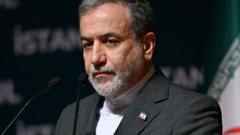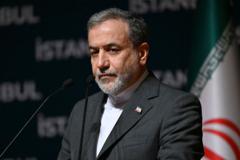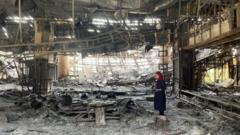Iran’s Foreign Minister Abbas Araghchi has publicly acknowledged the "excessive and serious" damage inflicted on the nation’s nuclear facilities due to recent airstrikes conducted by the US and Israel. This admission comes as the Iranian leadership continues to assert that the strikes have not disrupted their nuclear ambitions. During an appearance on state television, Araghchi noted that while the Atomic Energy Organisation of Iran is in the process of assessing the damage, Supreme Leader Ayatollah Ali Khamenei has dismissed claims of significant impairment, labeling them as exaggerations.
Iran's Foreign Minister Confirms Significant Damage to Nuclear Facilities Following US-Israeli Strikes

Iran's Foreign Minister Confirms Significant Damage to Nuclear Facilities Following US-Israeli Strikes
The Iranian government grapples with the aftermath of recent bombings, revealing serious damage to its nuclear sites while navigating a complex diplomatic landscape.
Khamenei proclaimed that the strikes failed to realize any substantial goals. In contradiction to this optimism, Araghchi's statement sparked concerns over the future of Iran's nuclear program and the potential for resumed diplomatic negotiations. Araghchi also indicated that there are currently no plans to return to talks with the US, especially after Iran aborted a scheduled sixth round of negotiations triggered by the escalation in hostilities.
With the Trump administration proposing aid to help Iran develop a civilian nuclear energy program in exchange for a commitment to curb military capabilities, the situation remains precarious. Following the approval of a new bill by Iran's parliament to cease cooperation with the International Atomic Energy Agency, there is uncertainty about the nation’s future commitments to nuclear oversight.
While the US and Israel maintain that the strikes have dealt a significant blow to Iran's nuclear ambitions, reports of casualties from the conflict highlight a dire humanitarian crisis. As Tehran endures the effects of military action and internal strife, the long-term implications for regional stability and nuclear proliferation continue to be debated.
With the Trump administration proposing aid to help Iran develop a civilian nuclear energy program in exchange for a commitment to curb military capabilities, the situation remains precarious. Following the approval of a new bill by Iran's parliament to cease cooperation with the International Atomic Energy Agency, there is uncertainty about the nation’s future commitments to nuclear oversight.
While the US and Israel maintain that the strikes have dealt a significant blow to Iran's nuclear ambitions, reports of casualties from the conflict highlight a dire humanitarian crisis. As Tehran endures the effects of military action and internal strife, the long-term implications for regional stability and nuclear proliferation continue to be debated.





















